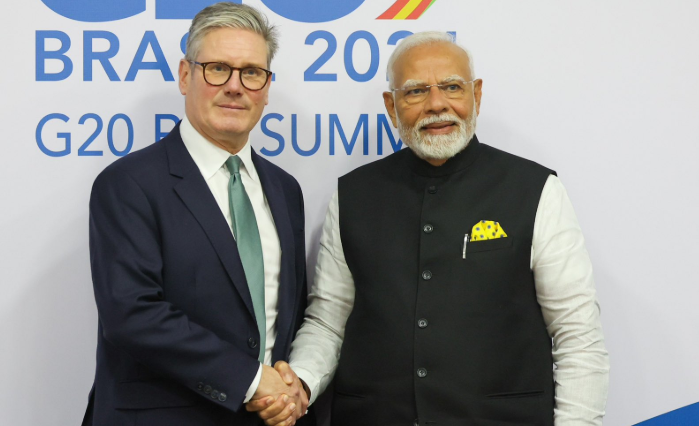PM Modi’s UK and Maldives Visit 2025:Prime Minister Narendra Modi begins a two-nation tour to the UK and Maldives. Key highlights include the signing of the India-UK Free Trade Agreement, extradition talks on fugitives like Vijay Mallya and Nirav Modi, concerns over Khalistani extremism, and strengthening India’s maritime diplomacy in the Indian Ocean.
PM Modi’s UK and Maldives Visit 2025
In a significant move to expand India’s global footprint and deepen strategic partnerships, PM Modi has embarked on a two-nation tour, beginning July 23, with scheduled stops in the United Kingdom and the Maldives. This diplomatic outreach comes at a critical time when New Delhi is focusing on enhancing its global influence and realigning with key international partners.
The UK leg of the tour, scheduled for July 23–24, marks PM Modi’s fourth official visit to the United Kingdom. His visit is being hosted by the new UK Prime Minister, Kia Starmer, and is aimed at boosting the India-UK Comprehensive Strategic Partnership. The agenda includes wide-ranging talks covering trade, defense, climate action, technology, and education.
One of the most anticipated outcomes of the UK visit is the signing of the long-awaited India-UK Free Trade Agreement (FTA), which recently received cabinet approval in New Delhi. This agreement is expected to significantly bolster economic ties and open up new avenues for trade and investment across sectors, including pharmaceuticals, automotive, technology, and services.

The diplomatic relationship between India and the UK has witnessed a steady upward trajectory in recent years. The two leaders had earlier met on the sidelines of the G20 summit in Brazil last year and later had a brief interaction during the G7 summit held in Canada in June 2025. The camaraderie between PM Modi and his UK counterpart further deepened after the Pagam terror attack in April this year, when Prime Minister Starmer was among the first world leaders to reach out and express solidarity with India.
However, the visit also touches upon some sensitive issues. In a media briefing ahead of the trip, Foreign Secretary Vikram Misri stated that India has once again raised concerns with the UK regarding the growing activities of Khalistani extremist groups operating on British soil. He emphasized that these groups not only pose a threat to India’s national security but also undermine social cohesion and public order in the host country.
“This is a matter of concern not only to us but it should be a matter of concern to our partners as well because this impacts social cohesion and social order in these other countries,” said Misri.
Extradition of economic fugitives has also emerged as a key agenda during PM Modi’s UK visit. India continues to press for the return of high-profile economic offenders such as Vijay Mallya, who defaulted on loans worth $1.1 billion through his defunct Kingfisher Airlines, Nirav Modi, accused in the $2 billion Punjab National Bank scam, and Lalit Modi, charged with money laundering and FEMA violations.
Foreign Secretary Misri pointed out that while India has consistently pursued these cases, challenges remain due to the UK’s legal framework. As a signatory to the European Convention on Human Rights, UK courts retain the discretion to reject extradition requests if the accused may face life imprisonment or capital punishment in the requesting country. Furthermore, the British Human Rights Commission mandates strict scrutiny under Article 8 of the Human Rights Act of 1998, which ensures that extradition does not infringe on the individual rights of the accused.
This legal environment has been strategically exploited by many fugitives, allowing them to delay or evade justice by leveraging these protections. “Fugitives from Indian law and Indian justice in the UK have been a matter of discussion between both sides and we have continued to make the case for these fugitives to be rendered to India,” Misri noted.
Following his UK visit, PM Modi will head to the Maldives on July 25. His visit there is expected to focus on reinforcing India’s ‘Neighbourhood First’ policy and advancing maritime diplomacy. High-level discussions will likely include defense cooperation, blue economy projects, and joint initiatives on climate resilience and disaster preparedness in the Indian Ocean region.
With this two-nation tour, PM Modi aims to solidify India’s position as a key global player while simultaneously addressing longstanding bilateral issues and forging new avenues for cooperation. The visit reflects India’s broader strategy to enhance its influence and strategic depth both in the West and its immediate maritime neighborhood.

